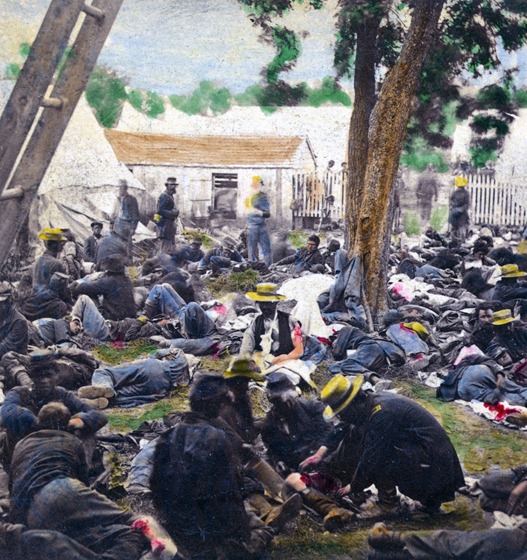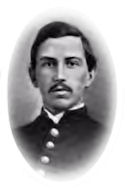28th.—The casualties among our friends, so far, not very numerous. My dear R. T. C. is here, slightly wounded; he hopes to return to his command in a few days. Colonel Allen, of the Second Virginia, killed. Major Jones, of the same regiment, desperately wounded. Wood McDonald killed. But what touches me most nearly is the death of my young friend, Clarence Warwick, of this city. Dearly have I loved that warm-hearted, high-minded, brave boy, since his early childhood. To-night I have been indulging sad memories of his earnest manner and affectionate tones, from his boyhood up; and now what must be the shock to his father and brothers, and to those tender sisters, when to-morrow the telegraph shall tell them of their loss! His cousin, Lieutenant-Colonel Warwick, is desperately wounded. Oh, I pray that his life may be spared to his poor father and mother! He is so brave and skilful an officer that we cannot spare him, and how can they? The booming of cannon still heard distinctly, but the sound is more distant.
Thursday, June 28, 2012

“To-night I have been indulging sad memories of his earnest manner and affectionate tones, from his boyhood up;”—Diary of a Southern Refugee, Judith White McGuire.
Saturday, 28th.—Got furlough for thirty days, dated June 24th; was sent to me from Knoxville.
(Note: picture is of an unidentified Confederate soldier.)
From Library of Congress:
Summary: Photo shows a makeshift field hospital with wounded soldiers sitting and lying on the ground while some receive care. Includes the straw-hatted Sixteenth New York Infantry who fought at Gaines’ Mill on June 27. Most were captured when Confederates overtook the area during the battle of Savage’s Station on June 29. (Source: Bob Zeller, Civil War in Depth, v. 1, p. 34)
Photographed by James F. Gibson
Civil War Photograph Collection. Library of Congress Prints and Photographs Division Washington, D.C.
Record page for this image: http://www.loc.gov/pictures/item/2011646181/
__________
Note: I used a photo editor to correct for fading, crop, and digitally enhance the image.
June 28, 1862.
IT seems almost incredible that this fine army, planted solidly, so near Richmond that the ringing of the bells within the city can be distinctly heard in its camps, should give up the task, surrender its magnificent works, much of its immense supplies, and undertake a difficult and dangerous movement, without making one supreme effort to accomplish its original purpose. Such is the determination of the general commanding however, and our great expectations are frustrated and in the judgment of most of us, without sufficient cause. The whole army is disgusted, and greatly disappointed; much more anxious to fight than retreat, and ready on the instant to make a dash forward at the signal of its commander, however, “Ours not to reason why.” Throughout the 28th there was a complete lull; the enemy apparently loth to follow up his success, probably from his astonishment at our withdrawing from the Gaines’ Mill position. The delay on his part was of the greatest importance to us as it gave the teams and impedimenta time to get well ahead. We remained under arms during the day, and throughout the night, but did not move.
June 28th.—Victory! Victory heads every telegram now;¹ one reads it on the bulletin-board. It is the anniversary of the battle of Fort Moultrie. The enemy went off so quickly, I wonder if it was not a trap laid for us, to lead us away from Richmond, to some place where they can manage to do us more harm. And now comes the list of killed and wounded. Victory does not seem to soothe sore hearts. Mrs. Haskell has five sons before the enemy’s illimitable cannon. Mrs. Preston two. McClellan is routed and we have twelve thousand prisoners. Prisoners! My God! and what are we to do with them? We can’t feed our own people.
For the first time since Joe Johnston was wounded at Seven Pines, we may breathe freely; we were so afraid of another general, or a new one. Stonewall can not be everywhere, though he comes near it.
Magruder did splendidly at Big Bethel. It was a wonderful thing how he played his ten thousand before McClellan like fireflies and utterly deluded him. It was partly due to the Manassas scare that we gave them; they will never be foolhardy again. Now we are throwing up our caps for R. E. Lee. We hope from the Lees what the first sprightly running (at Manassas) could not give. We do hope there will be no “ifs.” “Ifs” have ruined us. ShiIoh was a victory if Albert Sidney Johnston had not been killed; Seven Pines if Joe Johnston had not been wounded. The “ifs” bristle like porcupines. That victory at Manassas did nothing but send us off in a fool’s paradise of conceit, and it roused the manhood of the Northern people. For very shame they had to move up.
A French man-of-war lies at the wharf at Charleston to take off French subjects when the bombardment begins. William Mazyck writes that the enemy’s gunboats are shelling and burning property up and down the Santee River. They raise the white flag and the negroes rush down on them. Planters might as well have let these negroes be taken by the Council to work on the fortifications. A letter from my husband:
![]()
Richmond, June 29,1862.
My Dear Mary:
For the last three days I have been a witness of the most stirring events of modern times. On my arrival here, I found the government so absorbed in the great battle pending, that I found it useless to talk of the special business that brought me to this place. As soon as it is over, which will probably be to-morrow, I think that I can easily accomplish all that I was sent for. I have no doubt that we can procure another general and more forces, etc.
The President and General Lee are inclined to listen to me, and to do all they can for us. General Lee is vindicating the high opinion I have ever expressed of him, and his plans and executions of the last great fight will place him high in the roll of really great commanders.
The fight on Friday was the largest and fiercest of the whole war. Some 60,000 or 70,000, with great preponderance on the side of the enemy. Ground, numbers, armament, etc., were all in favor of the enemy. But our men and generals were superior. The higher officers and men behaved with a resolution and dashing heroism that have never been surpassed in any country or in any age.
Our line was three times repulsed by superior numbers and superior artillery impregnably posted. Then Lee, assembling all his generals to the front, told them that victory depended on carrying the batteries and defeating the army before them, ere night should fall. Should night come without victory all was lost, and the work must be done by the bayonet. Our men then made a rapid and irresistible charge, without powder, and carried everything. The enemy melted before them, and ran with the utmost speed, though of the regulars of the Federal army. The fight between the artillery of the opposing forces was terrific and sublime. The field became one dense cloud of smoke, so that nothing could be seen, but the incessant flash of fire. They were within sixteen hundred yards of each other and it rained storms of grape and canister. We took twentythree pieces of their artillery, many small arms, and small ammunition. They burned most of their stores, wagons, etc.
The victory of the second day was full and complete. Yesterday there was little or no fighting, but some splendid maneuvering, which has placed us completely around them. I think the end must be decisive in our favor. We have lost many men and many officers; I hear Alex Haskell and young McMahan are among them, as well as a son of Dr. Trezevant. Very sad, indeed. We are fighting again today ; will let you know the result as soon as possible. Will be at home some time next week. No letter from you yet.
With devotion, yours,
James Chesnut.
A telegram from my husband of June 29th from Richmond: “Was on the field, saw it all. Things satisfying so far. Can hear nothing of John Chesnut. He is in Stuart’s command. Saw Jack Preston; safe so far. No reason why we should not bag McClellan’s army or cut it to pieces. From four to six thousand prisoners already.” Doctor Gibbes rushed in like a whirlwind to say we were driving McClellan into the river.
![]()
______
¹ The first battle of the Chickahominy, fought on June 27, 1862. It is better known as the battle of Gaines’s Mill, or Cold Harbor. It was participated in by a part of Lee’s army and a part of McClellan’s, and its scene was about eight miles from Richmond.
June 28.—A small party of Union troops under the command of Lieutenant Glenn, was this day attacked by a body of Indians near Rocky Ridge, Utah. Two white men and one Indian were killed.—The rebel General Hindman burned the railroad bridge at Madison, Arkansas, fearing that General Curtis would pass that way to the Mississippi.
—Five clergymen, who refused to take the oath of allegiance to the Government of the United States, were this day imprisoned in Nashville, Tenn., by order of Andrew Johnson, Governor of the State.
—The battle of the Chickahominy, Va., took place this day.—(Doc. 78.)
—Flag-officer D. G. Farragut reported to the Secretary of the Navy that the Union fleet passed up above Vicksburgh, silencing the shore batteries while passing, and that he had communicated with Gen. Halleck and Commodore Davis. —Official Despatch.—(Doc. 143.)






